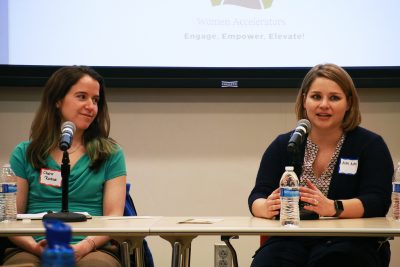
The STEM fields have been known to be heavily male-dominated. Women Accelerators is an organization working to address this gender gap. Women Accelerators is dedicated to “promoting the advancement of women and bridging the gender gap,” according to their website. They provide resources, networking and mentoring with the goal of creating female leaders.
On Tuesday, Women Accelerators hosted an event titled “My Journey in STEM: Struggle, Accomplishment, and the Future,” a panel discussion with five women working in STEM fields. The purpose of the event was to provide an opportunity for women to learn about STEM careers and the stories of successful women in these fields, said Brandy Houser, co-founder of Women Accelerators.
“I think the development of community where all women feel welcome and included and can actually ask questions on how they shape their careers is important,” Houser said. “Women can offer support to each other, saying things like, ‘Oh, I’ve been there. Here are some tips going forward.’”
The conference took place at the Broad Institute in Cambridge. The panel included Rajia Abdelaziz, the co-founder and CEO of invisaWear Technologies LLC, which develops smart technology in accessories; Tammy Heesakker, principal at Tyche Innovation LLC, working to start a new medical device company; Shila Mekhoubad, a researcher at a stem cell biology lab; Cherie Lynn Ramirez, a lecturer in biochemistry at Simmons College and Anita Autry, a postdoctoral fellow at Harvard University researching neuroscience.
Houser said she hopes the audience will learn from these five women and that “hopefully, they can create different connections to either advance their career or answer any questions they may have.”
Autry, one of the panelists, recalled one of the initial moments that sparked her scientific interest before the panel. Her father was a mechanical engineer and exposed her to science and math concepts at a young age. She said that when she was about eight years old, she and her father were waiting for her sister to finish dance practice, and, to fill the time, her father decided to explain pi to her.
Later, Autry’s mother suffered a stroke during her freshman year of college and she narrowed down her interest in science to neuroscience specifically.
“I got really interested in how the brain controls things like motor signals to language and cognition,” Autry said.
As a postdoctoral fellow, Autry uses lasers and many sophisticated techniques to see how specific groups of neurons affect parental behavior in mice. Autry said she enjoys this specific study, noting, “it’s very cool since I’m a new mother.”
Although Autry was given encouragement and the support needed to work in a demanding neuroscience lab while balancing motherhood, the same is not true for all women.
According to a report from the American Association of University Women, “negative stereotypes about girls’ and women’s abilities in mathematics and science persist” despite the considerable progress girls and women in STEM fields have made in the last few decades. The report demonstrates that, from an early age, these stereotypes can negatively affect girls’ interest and achievement in STEM fields.
While advances have been made in biosciences, the STEM fields continue to be dominated by men. According to a 2017 report from the National Science Foundation, the ratio of men to women varies across the board, but in computer sciences, women make up 18 percent of the industry.
This gender gap continues after college. According to the report, out of everyone working in science and engineering occupations, less than a third are women.
This gender gap is felt by some students at Boston University.
“I have never had a female teacher and 90 percent of my casemates are always male,” said Kerin Grewal, a sophomore in BU’s College of General Studies studying computer science.
Grewal always receives surprised reactions whenever she tells someone what she is studying, she said.
“I’m in a club that builds apps for nonprofit organizations,” Grewal said. “Every time I tell someone I’m in that club, they’ll say, ‘Oh my god, you’re so smart. I can’t believe you do that.’”
These reactions can be frustrating and annoying, but they don’t discourage her, she said.
“I like when people ask me how or why I would possibly choose to become a computer science major, and I think it’s cool that it’s something most people don’t think they could do,” Grewal said.
However, other students said they feel negative gender stereotypes are no longer a factor in college. Alejandra Flores, a junior in BU’s College of Engineering, said that her father is also an engineer.
The engineering school is a very collaborative environment for both genders, Flores said.
“Everyone just enjoys helping each other become better engineers,” she said.
Flores has proven that she is not dismissed for her gender through her achievements in her academic career. She was recently elected president of the Engineering Student Government.
Regardless of inclusion, Autry said she believes that the disparity lies in the retention rate of women in STEM fields, not in women’s desire to work in those areas.
“The problem hasn’t been recruiting,” Autry said. “People are interested in it, women want to study it. The problem is retaining people.”
Autry says that as work becomes more demanding it becomes harder for women with children. She said that people need to be more aware of the accessibility and flexibility of STEM fields by supporting other members in the STEM community.
“You can have a family and do it,” Autry said. “Not just show it, [but] support people so that they can actually do it.”
This article has been updated.
























































































































